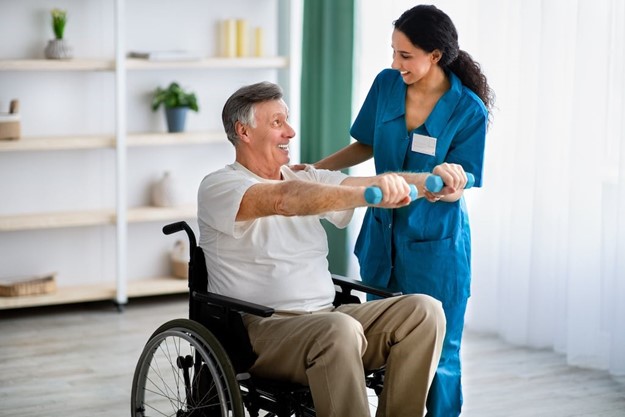A nurse is caring for a client who had a stroke and requires assistance with morning ADLs.
Which of the following interprofessional team members should the nurse consult?
Physical therapist.
Occupational therapist.
Speech-language pathologist.
Registered dietician.
The Correct Answer is B
A nurse should consult an occupational therapist when caring for a client who had a stroke and requires assistance with morning ADLs.
Occupational therapists specialize in helping individuals regain their ability to perform activities of daily living (ADLs) and can provide valuable assistance in this situation.

Choice A is wrong because a physical therapist focuses on improving mobility and physical function.
Choice C is wrong because a speech-language pathologist focuses on improving communication and swallowing abilities.
Choice D is wrong because a registered dietician focuses on nutrition and dietary needs.
Nursing Test Bank
Naxlex Comprehensive Predictor Exams
Related Questions
Correct Answer is C
Explanation
“This test will provide information about the function of your liver.” An alanine aminotransferase (ALT) test measures the level of ALT in the blood, which is an enzyme found primarily in the liver.
Elevated levels of ALT can indicate liver damage or disease.
Choice A, “This test will indicate if you are at risk for developing blood clots,” is not correct as an ALT test does not provide information about blood clot risk.
Choice B, “This test will determine if your heart is performing properly,” is not correct as an ALT test does not provide information about heart function.
Choice D, “This test is used to check how your kidneys are working,” is not correct as an ALT test does not provide information about kidney function.
Correct Answer is C
Explanation
When caring for a client who has wrist restraints after an episode of violent behavior, the nurse should remove one restraint at a time.
This allows the nurse to assess the client’s behavior and response to having one arm free while still maintaining some level of control and safety.
Choice A is wrong because tying the restraints to the side rail can be dangerous as it can cause injury to the client if they move suddenly.
Choice B is wrong because removing the restraints every 3 hours is not a specific guideline and may vary depending on the facility’s policy and the client’s condition.
Choice D is wrong because securing restraints with a square knot can make it difficult to quickly release the restraints in an emergency.
Whether you are a student looking to ace your exams or a practicing nurse seeking to enhance your expertise , our nursing education contents will empower you with the confidence and competence to make a difference in the lives of patients and become a respected leader in the healthcare field.
Visit Naxlex, invest in your future and unlock endless possibilities with our unparalleled nursing education contents today
Report Wrong Answer on the Current Question
Do you disagree with the answer? If yes, what is your expected answer? Explain.
Kindly be descriptive with the issue you are facing.
